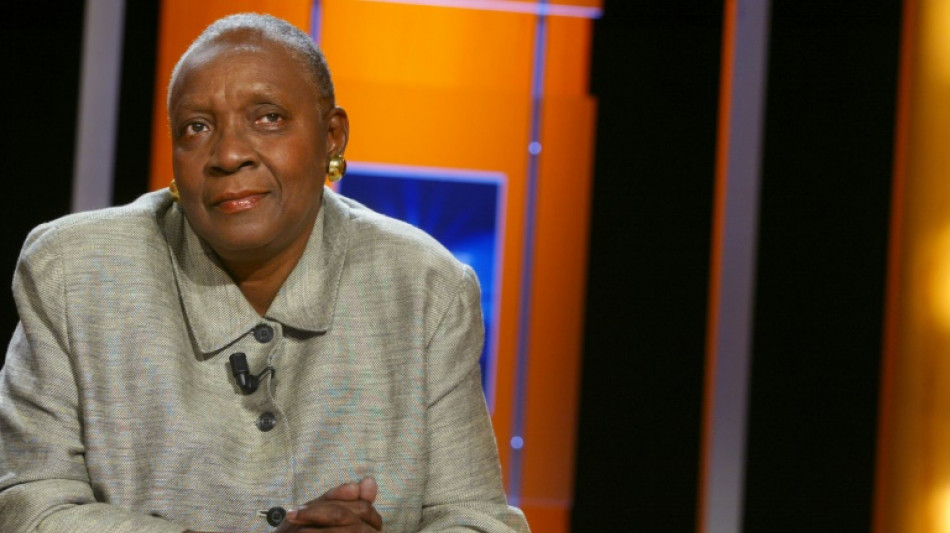
-
 French ice dancers poised for Winter Olympics gold amid turmoil
French ice dancers poised for Winter Olympics gold amid turmoil
-
Norway's Ruud wins error-strewn Olympic freeski slopestyle

-
 More Olympic pain for Shiffrin as Austria win team combined
More Olympic pain for Shiffrin as Austria win team combined
-
Itoje returns to captain England for Scotland Six Nations clash

-
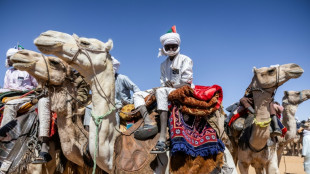 Sahara celebrates desert cultures at Chad festival
Sahara celebrates desert cultures at Chad festival
-
US retail sales flat in December as consumers pull back

-
 Bumper potato harvests spell crisis for European farmers
Bumper potato harvests spell crisis for European farmers
-
Bangladesh's PM hopeful Rahman warns of 'huge' challenges ahead
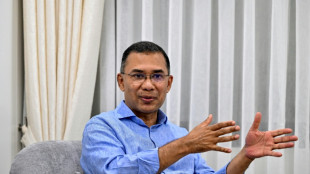
-
 Guardiola seeks solution to Man City's second half struggles
Guardiola seeks solution to Man City's second half struggles
-
Shock on Senegalese campus after student dies during police clashes
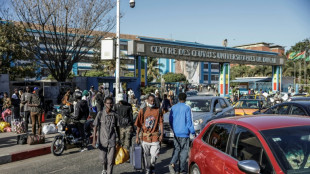
-
 US vice president Vance on peace bid in Azerbaijan after Armenia visit
US vice president Vance on peace bid in Azerbaijan after Armenia visit
-
'Everything is destroyed': Ukrainian power plant in ruins after Russian strike

-
 Shiffrin misses out on Olympic combined medal as Austria win
Shiffrin misses out on Olympic combined medal as Austria win
-
EU lawmakers back plans for digital euro

-
 Starmer says UK govt 'united', presses on amid Epstein fallout
Starmer says UK govt 'united', presses on amid Epstein fallout
-
Olympic chiefs offer repairs after medals break

-
 Moscow chokes Telegram as it pushes state-backed rival app
Moscow chokes Telegram as it pushes state-backed rival app
-
ArcelorMittal confirms long-stalled French steel plant revamp

-
 New Zealand set new T20 World Cup record partnership to crush UAE
New Zealand set new T20 World Cup record partnership to crush UAE
-
Norway's Ruud wins Olympic freeski slopestyle gold after error-strewn event

-
 USA's Johnson gets new gold medal after Olympic downhill award broke
USA's Johnson gets new gold medal after Olympic downhill award broke
-
Von Allmen aims for third gold in Olympic super-G

-
 Liverpool need 'perfection' to reach Champions League, admits Slot
Liverpool need 'perfection' to reach Champions League, admits Slot
-
Spotify says active users up 11 percent in fourth quarter to 751 mn

-
 AstraZeneca profit jumps as cancer drug sales grow
AstraZeneca profit jumps as cancer drug sales grow
-
Waseem's 66 enables UAE to post 173-6 against New Zealand

-
 Stocks mostly rise tracking tech, earnings
Stocks mostly rise tracking tech, earnings
-
Say cheese! 'Wallace & Gromit' expo puts kids into motion

-
 BP profits slide awaiting new CEO
BP profits slide awaiting new CEO
-
USA's Johnson sets up Shiffrin for tilt at Olympic combined gold

-
 Trump tariffs hurt French wine and spirits exports
Trump tariffs hurt French wine and spirits exports
-
Bangladesh police deploy to guard 'risky' polling centres

-
 OpenAI starts testing ads in ChatGPT
OpenAI starts testing ads in ChatGPT
-
Three-year heatwave bleached half the planet's coral reefs: study
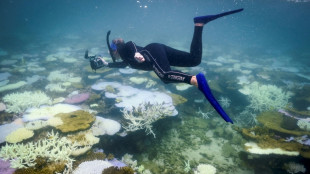
-
 England's Buttler calls McCullum 'as sharp a coach as I ever worked with'
England's Buttler calls McCullum 'as sharp a coach as I ever worked with'
-
Israel PM to meet Trump with Iran missiles high on agenda

-
 Macron says wants 'European approach' in dialogue with Putin
Macron says wants 'European approach' in dialogue with Putin
-
Georgia waiting 'patiently' for US reset after Vance snub

-
 US singer leaves talent agency after CEO named in Epstein files
US singer leaves talent agency after CEO named in Epstein files
-
Skipper Marsh tells Australia to 'get the job done' at T20 World Cup

-
 South Korea avert boycott of Women's Asian Cup weeks before kickoff
South Korea avert boycott of Women's Asian Cup weeks before kickoff
-
Barcelona's unfinished basilica hits new heights despite delays

-
 Back to black: Philips posts first annual profit since 2021
Back to black: Philips posts first annual profit since 2021
-
South Korea police raid spy agency over drone flight into North

-
 'Good sense' hailed as blockbuster Pakistan-India match to go ahead
'Good sense' hailed as blockbuster Pakistan-India match to go ahead
-
Man arrested in Thailand for smuggling rhino horn inside meat
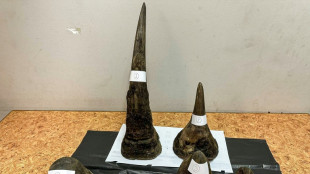
-
 Man City eye Premier League title twist as pressure mounts on Frank and Howe
Man City eye Premier League title twist as pressure mounts on Frank and Howe
-
South Korea police raid spy agency over drone flights into North

-
 Solar, wind capacity growth slowed last year, analysis shows
Solar, wind capacity growth slowed last year, analysis shows
-
'Family and intimacy under pressure' at Berlin film festival
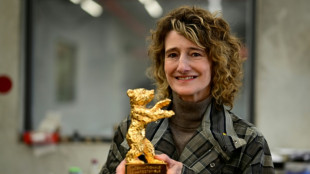

Maryse Conde: Daring storyteller who explored black identity
French writer Maryse Conde, who died on Tuesday at the age of 90, became one of the greatest chroniclers of the struggles and triumphs of the descendants of Africans taken as slaves to the Caribbean.
But the writer born in the Caribbean island of Guadeloupe did not pen her first book until she was nearly 40, and it triggered a controversy that saw authorities in several countries order the copies destroyed.
The mother of four, who once said she "did not have the confidence to present her writing to the outside world", was in her eighties before she won a major award, in 2018.
The New Academy Prize -- rushed into existence in Sweden when the Nobel Literature Prize was halted over a rape scandal -- praised how Conde "describes the ravages of colonialism and post-colonial chaos in a language which is both precise and overwhelming".
By then the francophone novelist, with close cropped grey hair, was confined to a wheelchair with a degenerative disease.
But she was delighted, saying in a video message that the Caribbean island of Guadeloupe, which is part of France, was normally "only mentioned when there are hurricanes or earthquakes".
- Called out African dictators -
As well as tackling racism, sexism and a multitude of black identities over 30 books, Conde was one of the first to call out the corruption of newly independent African states.
Her first book "Heremakhonon", which means "Waiting for Happiness" in the Malinke language of West Africa, caused a scandal in 1976 and three West African countries ordered the copies destroyed.
"In those days, the entire world was talking of the success of African socialism," she later wrote.
"I dared to say that... these countries were victims of dictators prepared to starve their populations."
She found popular and critical success with novels like "Segu" and "I, Tituba, Black Witch of Salem", but Conde still felt snubbed by the French literary establishment, never winning its top prizes.
There was belated recognition in 2020, when President Emmanuel Macron paid tribute to "the fights she has waged, and more than anything this kind of fever she carries within her," awarding her the Grand Cross of the National Order of Merit.
- Black awakening -
Conde's life was almost as eventful as one of her historical novels.
Born on February 11, 1934, as Maryse Boucolon, she grew up the youngest of eight children in a middle-class family in Guadeloupe, a French island in the Caribbean, and only became aware she was black when she left to go to an elite school in Paris when she was 19.
Growing up, she had not heard of slavery nor Africa, and her mother -- a schoolteacher -- banned the use of Creole at home.
Her literary imagination had been fired by Emily Bronte's "Wuthering Heights", which she later transplanted to the Caribbean in "Windward Heights".
In Paris her mind was opened to questions of identity when she met the Martinique writer and politician Aime Cesaire, one of the founders of the negritude literary movement that sought to reclaim black history and reject French colonial racism.
But unlike him, Conde was a passionate believer in independence from France.
"I understand that I am neither French nor European," she said in a 2011 documentary. "That I belong to another world and that I have to learn to tear up lies and discover the truth about my society and myself."
- Dramatic life -
Conde fell for a Haitian journalist, who left her when she got pregnant. Unmarried and with a small boy, she gave up on university.
Three years later she married Mamadou Conde, an actor from Guinea, and they moved to the west African country.
It fulfilled a need to explore her African roots, but life in the capital Conakry was tough. "Four children to feed and to protect in a city where there is nothing, it was not easy," she recalled.
Her marriage to Conde fell apart and she moved to Ghana and then Senegal, eventually marrying Richard Philcox, a British teacher who became her translator and, she would say, offered her the "calm and serenity" to become a writer.
She followed the scandal of "Heremakhonon", which centred on a Caribbean woman's disillusioned experience in Africa, with her "Segu" novels, set in the Bambara Empire of 19th-century Mali.
Then she published "I, Tituba, Black Witch of Salem" in 1986, about a slave who became one of the first women accused of witchcraft during the 1692 Salem witch trials in the United States.
That won her American acclaim, and Conde lived in New York for 20 years, founding the Center for Francophone Studies at Columbia University before moving to the south of France.
Her later works tended to be more autobiographical, including "Victoire: My Mother's Mother", about her grandmother who was a cook for a white Guadeloupean family.
M.Thompson--AMWN

